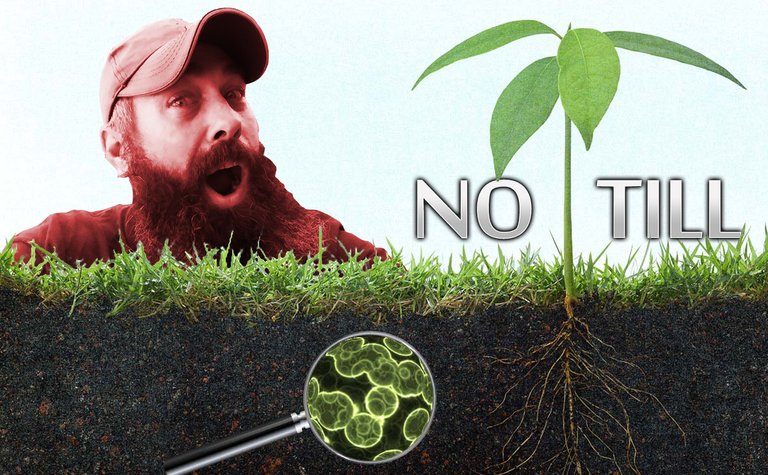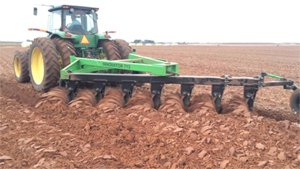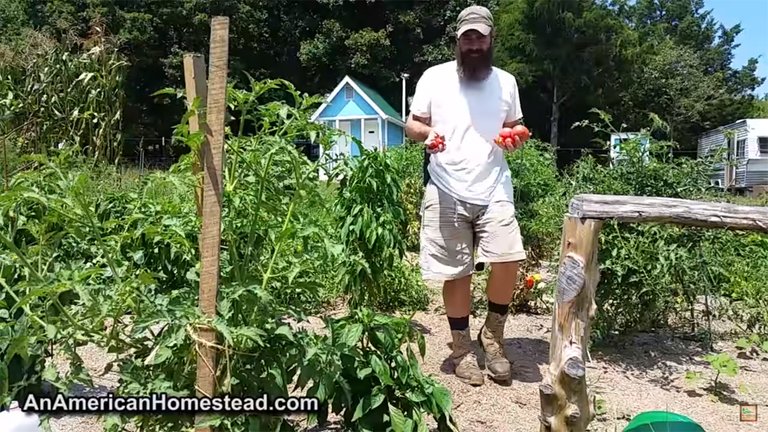
Now before I begin, I don't want you to think that I'm totally against tilling your soil. The first year on our homestead, we tilled over our soil simply because it needed it. What do I mean by that?
Turning over your soil will increase the oxygen content in your soil and thus will GREATLY accelerate the break down of any organic material within. This is fine if this is the first time the soil is being prepared for planting. But if you do it every year, the organic material in the soil has all rapidly been depleted and you will need some sort of fertilizer to get the production you will be happy with.
For new ground that is hard and never worked, it's ok to till in your first year because you will introduce lots of oxygen into the soil along with moisture at depths it has not before reached in good quantity. Then top off with lots of natural organic matter that will break down over time and feed and grow the microbial life that now has access to that oxygen and moisture.

The Modern Plow
The commercial farming industry is one thing. The backyard and hobby farmer is another. The latter is quickly learning the benefits of not tilling or plowing their land every year. And the former is slowly realizing this has all been a giant mistake. The Back To Eden movie by Paul Gautschi from Washington state was a huge step forward in this movement but it was actually an idea thought of much earlier.
In the 1940's, a book written by Edward Faulkner called the Plowman's Folly really first called into question the idea of continually turning over the soil in order to get plants to grow. Today, farmers are pouring tons of synthetic potassium, nitrogen and phosphorous additives on their planting ground just to get something to grow.
It's long been a joke meant to insult the American Indian (yes I used the politically incorrect term for the supposed natives who weren't really the original natives at all) by telling a story of a tribesman who saw a plowed field for the first time and responded with the words, "Wrong Side Up". But now we are seeing who will have the last laugh.

By constantly turning over your soil every year, you are destroying the ecosystems of millions of living organisms. In healthy soil, there are close to 50 billion microbes in just a tablespoon. Those microbes including yeast, beneficial nematodes, algae, fungi and various bacteria are busy growing and building their own infrastructure underneath the soil, and by tilling, you are destroying their hard work. It's all their hard work that makes the ground fertile enough to grow what you want to plant. Sure, you will always have small deficiencies that you can correct by proper monitoring and testing. By fixing these deficiencies, you are adding additional building blocks for these microbes to add to their already flourishing ecosystem.
Not to mention that healthy soil will have worms working in it to turn over soil giving great access to moisture and oxygen that the microbes need to flourish.
Last year I visited the home of master gardener Dr. Calvin Bey and interviewed him on this exact subject. You can see the video below. Dr. Bey is a big advocate in getting your soil tested and seeing if it lacks any major nutrient. And if it does, you can come back and add it naturally the way nature would add it. Dr. Calvin Bey has never tilled up his soil and he has amazing growth as you can see in the video.
In states like Virginia, almost 50% of the farmers have now switched to NO-TILL and are finding that it's becoming easier and cheaper to grow their crops. Before they had to spend more money on special patented seeds that could withstand the chemical herbicides being sprayed over the top of them. Now, seeds are cheaper and they are no longer buying the harmful chemical herbicides and synthetic fertilizers. That is just one state. But the idea is spreading!

And not only are farmers saving money on expensive GMO seeds and chemicals, they are finding they can get rid of equipment as well since a majority of their on-site machinery is purposed for yearly tillage. Talk about a WIN-WIN-WIN.
Cheaper seeds, less chemicals and less machinery to maintain and pay for. And all this of course leads to better healthier foods.
In nature, you don't see the need for overturned soil to achieve spectacular growth. So if that is the case with nature, why should we do any different in our gardens?
Visiting The Home Of A Master Gardener
Making Your First Year Garden Great!
Above are some videos that we think will help give you some great advice on getting started on gardening in a way that will allow your soil to give you fantastic production for years to come!
ENJOY THE VIDEO!

Visit Us Online: http://AnAmericanHomestead.com
JOIN US ON SOLA (TWITTER REPLACEMENT) FOR MORE HOMESTEAD CONTENT

https://sola.ai/americanhomestead



My soil is pure red clay. Rich in nutrients but not organics, except for fire ants {extraordinary tillers}. Still turning and amending, but will keep the vision of "wrong side up" in mind. Thanks for you educational posts. Always inspirational.
Do you have any advice on starting a productive garden with soil with a high clay content?
We have high clay content and we assumed the soil would be acidic. When we tested it, we were shocked to find it was alkaline. @iroshield
Layering with manure and straw and using the no-till approach works quite well for us. Lucky you to have mineral rich clay!
great information!!!! I am a living example of someone that you the soil is not too good, things wont come out of it in the right way or at all!!! growing up I was always into planting fruits and herbs without much success :(
thank you for sharing it
Sharing to show the right way to do this!
Thank you for the needs information.
We have to till around here just to get the water to flow, otherwise it would be impossible to get in this clay. Love the idea of no-till, just wish it worked around here.
It will work for you. Find some wheat straw or bags of mulched leaves at your local recycle center. Put down some manure and throw all those mulched leaves or pine needles, wheat straw or whatever you can find (that doesn't have grass seed in it) on top to cover it. The ground will become soft. TRUST ME. Add things like red wiggler worms or mushroom spawn under your covering to give it even more life! It will work!
You said you have clay soil there too, right? So is the concept to add all these things to build up and create new soil? Or does this essentially change the soil that’s already here?
It does both build and create new soil. 4 years ago we started this approach in a new garden area, the soil was red clay. After 4 years the level of black soil in 2-3 inches and has never been tilled. We leave the roots in the ground and cut the tops of the plants off in the fall. Zac is communicating some good stuff here!
I will have to give this a shot! Thank you everyone for the info.
I'm sure you can get this to work for you. The key concepts are to keep your soil covered at all times and to have a living root in the soil at all times. I started by covering my entire garden with wood chips which was a mistake because it takes about 3 years for the chips to breakdown but is was worth the wait the soil is amazing now. I learned a lot form this guy on youtube (https://www.youtube.com/user/iamnjorganic) also google "back to Eden garden" for Paul's garden tours he is inspiring.
I agree with you one hundred percent. I'm not into tilling but where I'm at I need to loosen the ground and add my nutrients too. Central Oregon is a tough place to grow the soil here is sandy loom . I do have a soil amendment that i use Biochar its the shit.
I use a Meadow Creature broadfork to break new ground and prep my garden beds. The broadfork lifts and improves air and drainage without overturningthe soil.
To establish a new bed, I put down cardboard and mulch or compost after the fork. I have read that it’s better to put the compost under the cardboard instead of on top.
Lately though I’ve been trying the no dig method of Charles Dowding.
That's great news, we 'turn over' the garden every spring and it's a lot of work. Not this year! Better to just leave it alone, save our backs. We have leaves on the our garden from last fall and the worms love it. There are tons of earthworms digging around, it would be a shame to disturb them. @ironshield
I am truly enjoying your posts!
Great post
Nice, we are also no-till growers, here's a post I did a couple weeks ago about how we approach it. It works great for us!
https://steemit.com/gardening/@schoonercreek/winter-garden-planning-for-success-the-time-is-now-how-to-gain-yields-with-this-easy-and-superior-method
I started this method last year but am still learning. I used wood chips but was concerned that there may be walnut chips in there or cedar which I was concerned would kill the garden. I am still going to do it again this year to see how we do. thank you for sharing.
Man you got that right, have you seen the no dig gardening
Back to Eden rocks! ;-)
AnAmericanHomestead has given me the motivation and information to start my own garden this year. You can follow me at Jword to see my productivity throughout this first year.
Yes yes yes, this is great, we need to feed the soil, protect it. Like you said we never see exposed soil in nature and nature is our greatest teacher. great post.
Excellent post! I've been no till since 1993. Good to see others following the practice and keeping their soil biology intact.